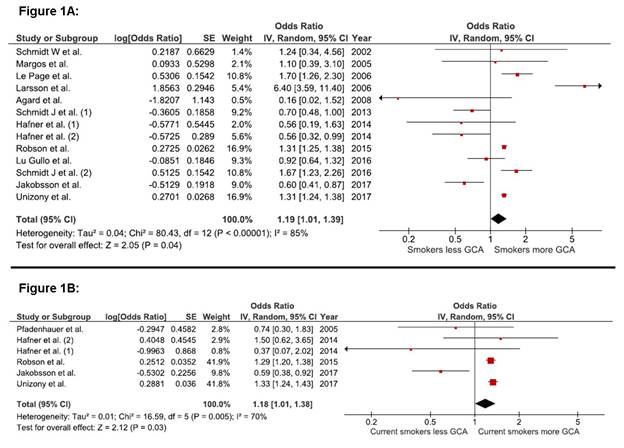Session Information
Session Type: ACR Poster Session A
Session Time: 9:00AM-11:00AM
Background/Purpose: Tobacco smoking is a well-established risk factor for the development of several autoimmune diseases such as rheumatoid arthritis and systemic lupus erythematosus. A similar association between smoking and giant cell arteritis (GCA) has been suspected but remains unclear due to limited study size and conflicting epidemiologic data. In order to further investigate the association between smoking and the development of GCA we conducted a systematic review and meta-analysis.
Methods: Two investigators (D.B. and M.K.) independently searched published studies indexed in MEDLINE and EMBASE from inception to February 2017 using the terms “giant cell arteritis,” “temporal arteritis,” “cranial arteritis,” and “Horton disease.” Recent conference abstracts available online were also reviewed. The following inclusion criteria were used: 1) original observational study comparing patients with GCA to healthy controls; 2) inclusion of smoking history; 3) provision of absolute numbers and/or statistical comparisons with 95% confidence intervals. Study eligibility was independently determined by the two investigators, with disagreements reviewed by a third investigator (P.U.) and resolved by consensus. RevMan 5.3 software was used for the data analysis. Point estimates and standard errors were extracted from individual studies and were combined by the generic inverse variance method of DerSimonian and Laird. Given the high likelihood of between-study variance, we used a random-effect model rather than a fixed-effect model. Statistical heterogeneity was assessed using the Cochran’s Q test.
Results: The initial search yielded 3312 articles. Of these, thirteen studies (8 prospective and, 5 retrospective case-control studies) with unique cohorts were identified and included in the primary analysis (ever vs. never smoking history). Patients in the GCA cohort were more likely to have a history of smoking with an odds ratio of 1.19 (95% CI, 1.01 – 1.39) [Figure 1A]. Considerable heterogeneity was present (I2 = 85%). Five of these studies included information on current smoking status. One additional study, which only reported current smoking status, was also included. The GCA cohort showed an association with current tobacco use with an odds ratio of 1.18 (95% CI, 1.01 – 1.38) [Figure 1B].
Conclusion: Our study demonstrated a statistically significant increased risk of GCA among smokers compared to non-smokers.
To cite this abstract in AMA style:
Brennan D, Ungprasert P, Warrington KJ, Koster MJ. Smoking As a Risk Factor for Giant Cell Arteritis: A Systematic Review and Meta-Analysis [abstract]. Arthritis Rheumatol. 2017; 69 (suppl 10). https://acrabstracts.org/abstract/smoking-as-a-risk-factor-for-giant-cell-arteritis-a-systematic-review-and-meta-analysis/. Accessed .« Back to 2017 ACR/ARHP Annual Meeting
ACR Meeting Abstracts - https://acrabstracts.org/abstract/smoking-as-a-risk-factor-for-giant-cell-arteritis-a-systematic-review-and-meta-analysis/

